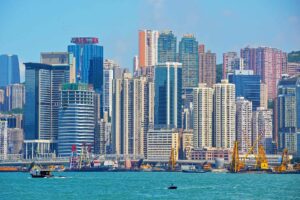The global outbreak of COVID-19 is affecting every aspect of human lives, especially the physical world. The worldwide measures taken to control the spread of the virus and reduction in economic activities has significantly affected the environment. The pandemic has brought a diversity of positive and negative impacts.
Positive effects
Air quality
Let’s start with the good before the bad! Social and economic activities had to slow down, this improved air quality in many cities and reduced water pollution in various parts of the world. Clear skies were witnessed in Los Angeles, parts of China, and other cities as air pollution reduced due to decreased transportation and companies and industries closing.  The carbon dioxide emissions were predicated have nearly halved due to COVID-19 restrictions. Nitrous Oxide is a key indicator of global economic activities, significant declines were observed globally, with a 54.3% decrease in Sao Paulo of Brazil and an astonishing 70% reduction in Delhi, India.
The carbon dioxide emissions were predicated have nearly halved due to COVID-19 restrictions. Nitrous Oxide is a key indicator of global economic activities, significant declines were observed globally, with a 54.3% decrease in Sao Paulo of Brazil and an astonishing 70% reduction in Delhi, India.
Vehicles are assumed to contribute almost 72% towards the greenhouse gas emissions of the transport sector. Additionally, aviation contributes approximately 11%. The restriction of international travel means many flights have been cancelled, reducing the number of departures, and in turn, the emissions resulting from this sector. At the peak of the pandemic, an approximate 96% global reduction in flights was reported. Global lockdowns meant many had to stay at home, this reduced the need to travel and how often vehicles were used, again reducing emissions.
Water pollution
Developing countries such as Bangladesh and India suffer from severe water pollution as domestic and industrial waste is commonly dumped into rivers without treatment. During the lockdown, the sources of this pollution greatly reduced, and therefore, reduced the extent of the pollution. The River Ganga reached a permissible limit of purity due to this reduction in pollution. A 500% reduction of sewage and industrial effluents alongside a decrease in visitors has greatly helped.
Ecological restoration

Tourism significantly contributes to global gross domestic
product. The tourism industry is responsible for approximately 8% of global greenhouse gas emissions. However, due to the outbreak and restrictions, the number of tourists visiting tourist hot spots globally reduced. For example, in Phuket, Thailand, there are an average of 5,452 visitors a day, but during the pandemic, this was not possible. While this had financial implications for the industry, the reduction in greenhouse gas emissions had positive effects on the environment. Furthermore, nature reserves that are frequently visited had minimal visitors, allowing nature to be left alone to flourish.
Negative effects
Waste generation
The drastic increase in PPE, including face masks, gloves, and visors, has generated a vast amount of waste. Biomedical waste has been generated from every hospital worldwide, it is an essential part of controlling the spread of the virus. In Wuhan, China, over 240 metric tonnes of medical waste were produced daily during the peak of the outbreak. In India,  Ahmedabad generated 1000 kg/day during the first lockdown. The rise in hazardous waste has become a major challenge for waste management. In China alone, 14.8 million medical masks have been produced daily. However, a lack of knowledge regarding infectious waste management has meant many people have dumped their PPE. This has created clogging in waterways and even impacted marine life.
Ahmedabad generated 1000 kg/day during the first lockdown. The rise in hazardous waste has become a major challenge for waste management. In China alone, 14.8 million medical masks have been produced daily. However, a lack of knowledge regarding infectious waste management has meant many people have dumped their PPE. This has created clogging in waterways and even impacted marine life.
Recycling restrictions
Quarantine policies caused an increase in the demand for online shopping and home delivery. Packaging from shipped goods increased the volume of household waste. While recycling is an effective way to curb the volume of waste sent to landfill during the pandemic to reduce the transmission of the virus, many countries postponed waste recycling, as seen in the USA. Overall, due to an increase in waste and reduction in recycling, landfilling and environmental pollutants increased globally.
Ecological imbalance
While wildlife experienced several positive impacts, the use of disinfectants had negative consequences on the ecosystem. Vast quantities of disinfectants have been applied to roads and other areas to exterminate the virus. This extensive use of disinfectants can kill non-target species, creating an ecological imbalance.
While positive impacts have resulted from the pandemic, there are also numerous long-lasting negative consequences. Medical masks take up to 450 years to degrade, we will be reminded of the unfortunate events of the pandemic for years to come. The pandemic has highlighted the need to better plan for such events while considering the environmental impacts. A UN environment figure, Joyce Msuya, has stated that the COVID-19 pandemic is “a warning from the planet that much worse lies in store unless we change our ways”.






